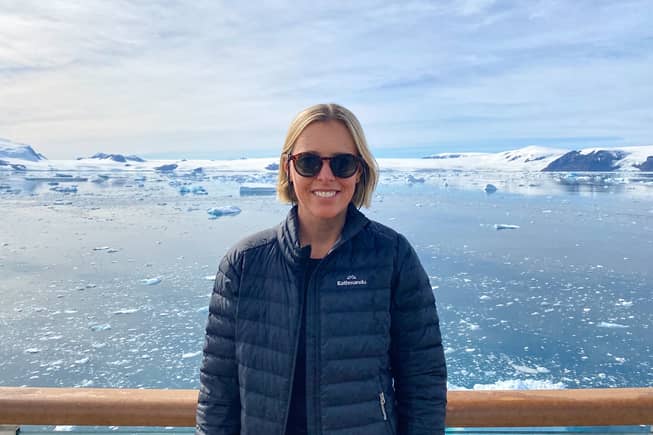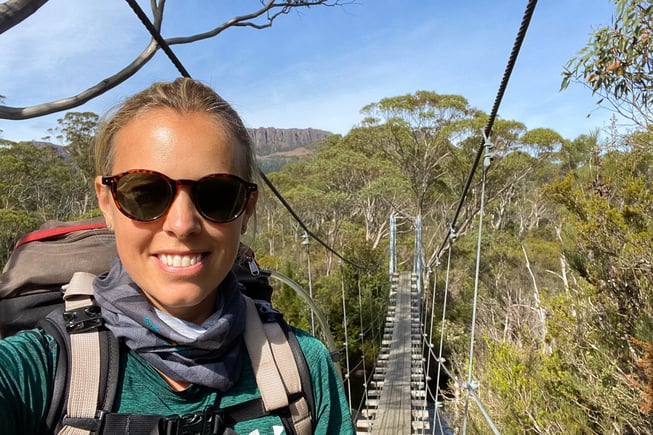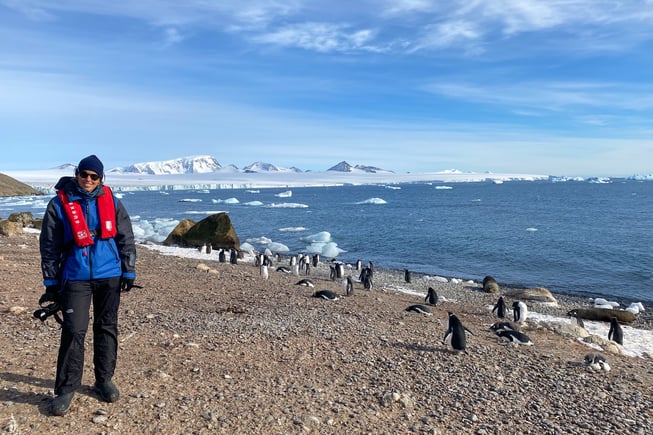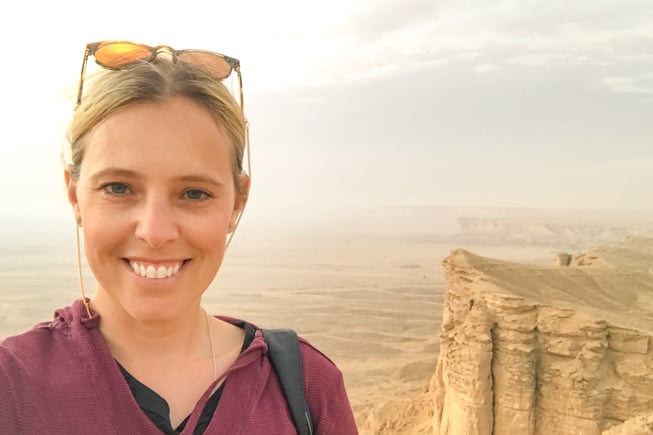Featured Explorer: Sarah Reid
Brooke Ostrom
Content and Community Manager

This April, we’re sharing the stories of travelers making a difference in sustainable and responsible travel. In today's feature, we tap into the expertise of award-winning travel journalist and author Sarah Reid.
Sarah has visited more than 120 countries and has a passion for positive-impact travel, where travelers support local communities and incorporate sustainable practices into their trip plans. She has been writing about sustainable travel for nearly 10 years, first through her job as an editor with Lonely Planet and now as a freelance writer. Her work has been published in more than 20 top travel publications, including AFAR, Travel + Leisure, Fodor’s, and more. In 2020, Sarah was named the Travel Writer of the Year at the 2020 Australian Society of Travel Writers Awards and Specialist Travel Writer of the Year: Emerging Destinations at the UK’s 2020 Travel Media Awards.
In addition to her freelance work, she has written two books for Lonely Planet, including The Sustainable Travel Handbook and The Solo Travel Handbook. Sarah also runs the website ecotravelist.com where she writes about topics including adventure travel, travel photography, food, and more.
We talked with Sarah about her career, the future of sustainable travel, her favorite travel memories, and more. She shares actionable tips for travelers looking to implement more sustainable practices when planning their trips.
How did you become interested in sustainable and responsible travel and choose this focus for your writing?
As a younger traveler, I participated in some classic travel experiences (including riding an elephant; cringe) that left me feeling uneasy about whether they were the right things to be doing on holiday. But there was a lack of resources available at the time to help me make more responsible decisions about how I spent my travel dollars.
The 2013 release of the documentary Blackfish was a turning point. Suddenly we had this overwhelming proof that certain travel experiences we had been participating in for our own enjoyment were doing terrible harm to others. It forced the entire industry, from operators to travel editors, to take a good hard look at our roles in that. Around that time, I started a job as an editor at Lonely Planet, and it inspired me to better educate myself about sustainable travel and use that knowledge to help guide the content I was overseeing. When I went freelance in 2016, sustainable travel organically became my niche.

Throughout your career, have you seen a growing interest in the topic of sustainable travel? If so, what excites you the most about this?
Interest has exploded during the past five years in particular, which is really exciting because sustainable travel is essential in safeguarding our planet for the people and wildlife who live in it today, as well as the travelers who will be exploring it tomorrow. A shift in traveler awareness of (and desire to support) sustainable travel has helped to put pressure on the industry to shape up, but it’s still early days, particularly when it comes to social sustainability – supporting local communities meaningfully is just as important as minimizing harm to the environment.
What are some of the top ways all travelers can incorporate sustainable or responsible practices into their travels?
An absolutely critical aspect of sustainable travel today, as outlined in the Glasgow Declaration on Climate Change in Tourism, is putting in the work to curb our emissions. There are countless ways to do this, from traveling closer to home, to choosing hotels that run on green energy, to staying longer in your travel destination rather than using the rest of your vacation days to take an emission-intensive trip elsewhere.
Supporting sustainably-minded businesses is another great way to minimize negative travel impacts. Scour hotel and tour operator websites to find out what initiatives they are taking to protect the local environment and support local communities. Minimizing the waste you create on holiday is another easy way to make a big impact; there is absolutely no excuse in 2022 to use plastic bottles in any destination, for example.
What do you think the future of sustainable travel is?
Sustainable travel is already shifting from a nice-to-do to a must-do, at least in some markets, which is really encouraging. But the industry’s most impactful decision-makers – namely aviation and governments – are not currently doing enough to facilitate a future where travel can be truly sustainable. The world’s 1.4 billion travelers should not underestimate the power we have to put pressure on these decision-makers via the everyday decisions we make ourselves, from the tourism operators we support to the politicians we elect.
What are some of your favorite travel memories?
Too many to choose from! So I’ll stick to some of the recent ones. Right before the pandemic, I took a brilliant trip to Guyana and Suriname with local operator Wilderness Explorers, which has worked closely with indigenous communities to develop some really memorable community tourism experiences in the nation’s steamy jungle interior, and I recently made my first trip to Antarctica with Aurora Expeditions, which was just as transformative as I had hoped. As both of these trips were quite carbon-intensive, it was important to me to visit with operators dedicated to protecting the destinations they take travelers to.
During the pandemic, I also really enjoyed exploring Australia with a number of Indigenous guides, who are masters at bringing landscapes to life with their incredible storytelling skills.

What has traveling taught you about yourself?
Nothing reveals your strengths, weaknesses, and privilege quite like traveling – especially solo travel, which is one of the best lessons in taking responsibility for yourself you will ever learn. Traveling for long periods (which I do often) has also completely changed my relationship with ‘stuff.’ These days, I only buy things I really need and then wear or use them until they fall apart. Not only do I have less stuff to worry about; it has also helped me save money.
Do you have career advice for anyone that would want to follow in your footsteps?
I’m a big believer in professional journalism training – not necessarily a university degree, but in a world where people are increasingly distrustful of the media, I think it’s incredibly important to have a solid grasp of essential skills like fact-checking, especially if you want to specialize in sustainable travel writing, as it’s not easy to see through the greenwashing. In 2020 I went back to university to complete a Graduate Certificate in Sustainable Tourism Management to deepen my own knowledge about sustainable travel, but I’m still learning.
Do you have any upcoming projects or travels that you’d like to share?
The pandemic has added a new dimension of flexibility to my life as a semi-nomadic travel writer that I am still figuring out how to manage. I’m currently based in the Middle East, where I’m enjoying the challenge of seeking out sustainable travel stories in unexpected places while also working on striking a more sustainable work/life balance.

To learn more about Sarah, and to keep up with her travels, visit her website .